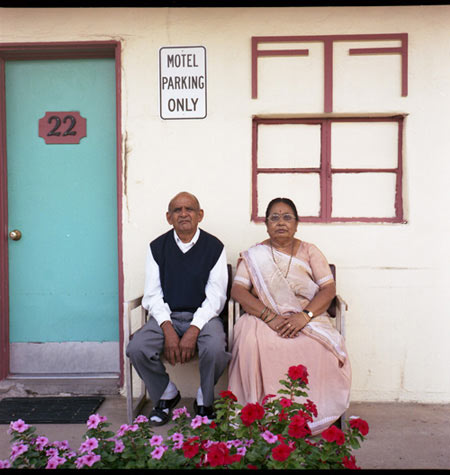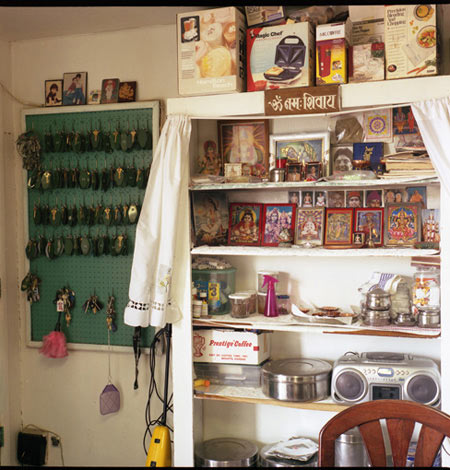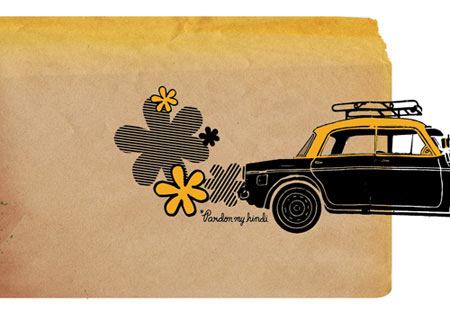indian motel

Outside the Budget Motel, Wichita, Kansas. all photos by Mark Hewko or Chirag
Today we meet Chirag, a first generation Indian motel owner’s son. What does that mean? Let’s talk to him and find out.
My Robot: You’re working on a project about your childhood, in a way. Can you describe it to us?
Chirag: It’s about independent motels in America and who’s behind the scenes. It started off when I was younger, I grew up living in a motel. It was like a living space attached to the reception and I grew up with that, going over to uncle’s houses, aunt’s houses, they all lived in motels. After being through all that, I have a huge appreciation for it. It’s a pretty fascinating story, so I wanted to do a photo documentary and interviews with all these independent motel owners that live and run these motels all over the country.
My Robot: Where was your parent’s motel?
Chirag: In New Jersey, Somerville, New Jersey, on Route 22.
My Robot: You told me earlier, what part of India your parents were from.
Chirag: They are from the state of Gujarat. All these people that own these motels in America are not only from the same state in India, but within a 150 mile radius in Gujarat.
My Robot: How is that? Why is that?
Chirag: It started in the fifties where they came over with student visas and wanted to earn a living and still save money, so they thought the best idea was to buy a property, a motel, and live and run a business in the same place. They helped each other out, whenever someone came to America they showed them the ropes till they got on their feet and it became a strong community, they become really strong, bought more motels, some bought multiple motels, some bought franchises. The community just grew and now owns 60 percent of all motels and hotels in America – including the big name franchises like Howard Johnson’s. It’s incredible to think all this came from one generation.

room keys to the left, shrine on the right, appliances above.
My Robot: So what does your project involve?
Chirag: I’ve taken two trips so far, with my friend Mark, all self funded. One was down south, concentrating on Virginia, drove from New York through North and South Carolina, Georgia, Alabama. It was a quick trip, just a couple weeks, to see if it was a realistic project.
After that trip we took another – flew from New York into Oklahoma and spent some time in Kansas, New Mexico and west Texas. We’re gonna be leaving for another trip in a couple weeks concentrating in California, mostly northern California, where it all started in the Fifties in Sacramento and San Francisco.
My Robot: Explain more of how it started, in the case of your father.
Chirag: He came over with his student visa, getting his master’s in chemistry. He got a job but by then a couple of his friends owned motels and he thought it was a good business to get into with his plan of bringing over the rest of his family. He bought the Arch Motel and raised the family. Slowly brought over his brothers and sisters and my mom’s brothers and sisters from India. The family stayed there and also learned the ropes of the motel industry; learned how to run a motel until they got on their own feet and were ready and ventured of to their own property, mostly in the middle of the country, the Midwest, small towns of America in Kansas, Texas, Minnesota.
My Robot: How would these foreigners – wait, can I say that?
Chirag: You’re racist is my response.
My Robot: Because they were citizens at that point, right? So what I mean is first generation immigrants, from such a different culture, how would they adapt, or even find a motel to buy in the Midwest?
Chirag: Through the small knit community. Word got around that people were looking for a place, so keep an eye out for everyone. At that point they were looking for places they could afford, tiny places in the middle of no where. Places not populated by Indians.
My Robot: So how did that affect their Indian identity?
Chirag: A lot of them stayed in their own bubble. Which is to say it didn’t affect them. I think it’s changing with the new generation. They’re definitely gonna have to be a lot more open and adapt. They stayed really tight and it made them stronger. (pauses) I don’t know man, depends how you look at it. It makes the community stronger but when you go out of your small knit group you’re actually making it stronger, making it wider and more knowledge-full. Instead of the same old bullshit.
My Robot: Tell me about the photo of the Indian garden behind that one motel.
Chirag: So a lot of these motels have gardens in the back and the reason for that is when they started, well, theres two reasons. Number one, most of these people came from a farming community in Gujarat and secondly, there was no Indian grocery stores around these rural areas, so they just had a garden with their Indian vegetables and lived off that mostly.
My Robot: What are Indian vegetables?
Chirag: I’m sure you coulda got a lot of that in the stores, but I guess, all these different kinds of beans and squashes. I’m sure they’re available now, but when they started back in the 60′s, 70′s, it was harder to find this shit.
My Robot: What about getting Indian spices?
Chirag: In the early days, they brought it with them in their suitcases. Nowadays it’s available even in Safeway. But they also traded with friends, relied on the community. People made runs. Say if you’re in Liberal, Kansas in the Seventies, one person is like, “I’m going to the closest Indian store” which is in Dallas. He’d ask the whole community what they want, and make a run with his buddy to Dallas. They’d come back with a hundred pounds of Basmati rice and some mango pickle.
My Robot: So you grew up in a motel in Jersey with traditional Indian parents, now you live in San Francisco and work as a graphic designer. That’s a lot of change in one generation. How do your parents feel about this country, your change?
Chirag: They knew they were coming to a totally different environment so they knew they were going to come across change. There’s still definitely shocks with stuff my sister and I did growing up. Like me going to art school while all the other Indian kids went to business or medical school.
My Robot: Are they worried about you still?
Chirag: What parent isn’t?
My Robot: True. So what’s the next step for the project?
Chirag: The thing I’m trying to do is get some funding, get this project to a point I can bring it to a publisher and then get it out there. I don’t want to work on it my whole life, just a couple more trips.
My Robot: What I’ve seen so far looks great, and it’s a fascinating story. These iconic motels with the great neon signs and ultra-American names are by and large owned by Indians. It’s a true immigrant success story. Thanks for bringing us the news, Chirag.
Chirag: I don’t know if anyone will care, but I’m having fun.

Chirag’s other work and interests can be seen at his website, Pardon My Hindi.
Wow. Fascinating. I knew a lot of motels were Indian-owned, but I had no idea so many were, and all from Gujarat.
Comment by Kitt — October 4, 2008 @ 7:04 am
Chirag had a lot to say, i hope he gets his book out.
Comment by Rolston — October 4, 2008 @ 8:20 pm
So glad you covered Chiraag and Mark’s project. There is a big story here and Chiraag has dedicated a lot of his time to documenting it. This is real important as the community is changing as is the whole motel culture with franchising and such. Weather they know it or not the next generation will be thankful that someone stopped and took these photos and got down these stories. Support Chiraag’s cause over at PMH and look hip with one of his groovey shirts.
Comment by gimpyeyes — October 12, 2008 @ 9:32 pm